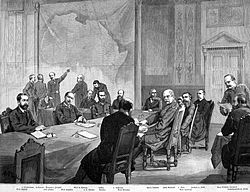
Back Koloniale Konferensie van Berlyn Afrikaans مؤتمر برلين (1884) Arabic Conferencia de Berlín AST Берлінская канферэнцыя (1884) Byelorussian Берлинска конференция Bulgarian Kuzuliadeg Berlin Breton Conferència de Berlín Catalan Berlínská konference Czech Berlinkonferencen (1884-85) Danish Kongokonferenz German


The Berlin Conference of 1884–1885 was a meeting of colonial powers that concluded with the signing of the General Act of Berlin,[1] an agreement regulating European colonisation and trade in Africa during the New Imperialism period. The conference of fourteen countries was organised by Otto von Bismarck, the first chancellor of Germany, at the request of Leopold II of Belgium.[2] It met on 15 November 1884 and, after an adjournment, concluded on 26 February 1885 with the signing of the General Act.
The General Act of Berlin can be seen as the formalisation of the Scramble for Africa that was already in full swing.[3] The conference contributed to ushering in a period of heightened colonial activity by European powers, and is sometimes cited as being responsible for the "carve-up of Africa".[citation needed] However, some scholars warn against overstating its role in the colonial partitioning of Africa, drawing attention to the many bilateral agreements concluded before and after the conference.[4][5][6] A 2024 study found that the only borders set at the conference were those of the Congo region (and these were subsequently revised), and that most of Africa’s borders did not take their final form until over two decades later.[7] Wm. Roger Louis conceded, however, that "the Berlin Act did have a relevance to the course of the partition" of Africa.[citation needed]
An alternative point of view has been presented that the Conference was about denying new weapons to Africa. The machine gun had been recently invented, which at the time was a weapon of mass destruction, and if this could be embargoed to Africa, there would be the possibility of a speedy conquest. Since embargoes are inevitably broken, it would be essential to act speedily. Ethiopia was able to gain modern weapons from Imperial Russia as both shared the Orthodox faith, which allowed Ethiopia to maintain its independence. The Russian Revolution of 1917 was the death knell of this embargo.[8]
European powers were also driven by economic motivations, as competition for the vast natural resources on the continent were crucial for industrialization and expansion. As European industries grew, the raw materials such as rubber, minerals, and cotton made Africa highly valuable. In addition, the control over the vast African markets allowed European countries to sell manufactured goods, leading to economic dominance in resources and trade. The Berlin Conference materialized these ambitions, preventing conflicts and establishing borders.[9][10]
Seven of the fourteen countries represented – Austria-Hungary, Russia, Denmark, the Netherlands, Sweden-Norway, the Ottoman Empire, and the United States – came home without any formal possessions in Africa.
- ^ The Belgian Congo and the Berlin act, by Keith, Arthur Berriedale, 1919, p. 52.
- ^ De Belgische Koloniën - Documentaire over het Belgisch Koloniaal Rijk (English: The Belgian Colonies - Documentary on the Belgian Colonial Empire) timestamp 10:40 to 10:52)
- ^ Bruce Gilley: In Defense of German Colonialism, September 1, 2022
- ^ Katzenellenbogen, S. (1996). "It didn't happen at Berlin: Politics, economics and ignorance in the setting of Africa's colonial boundaries.". In Nugent, P.; Asiwaju, A. I. (eds.). African Boundaries: Barriers, Conduits and Opportunities. London: Pinter. pp. 21–34.
- ^ Craven, M. (2015). "Between law and history: the Berlin Conference of 1884–1885 and the logic of free trade". London Review of International Law. 3: 31–59. doi:10.1093/lril/lrv002.
- ^ Cite error: The named reference
Crowewas invoked but never defined (see the help page). - ^ Paine, Jack; Qiu, Xiaoyan; Ricart-Huguet, Joan (2024). "Endogenous Colonial Borders: Precolonial States and Geography in the Partition of Africa". American Political Science Review. 119: 1–20. doi:10.1017/S0003055424000054. ISSN 0003-0554.
- ^ Ladimeji: Ethiopia and Berlin, February 2025
- ^ Pakenham, Thomas (15 December 1991). The Scramble for Africa. HarperCollins.
- ^ Boahem, Adu A (1 September 1989). African Perspectives on Colonialism. JohnsHopkinsPress.
© MMXXIII Rich X Search. We shall prevail. All rights reserved. Rich X Search